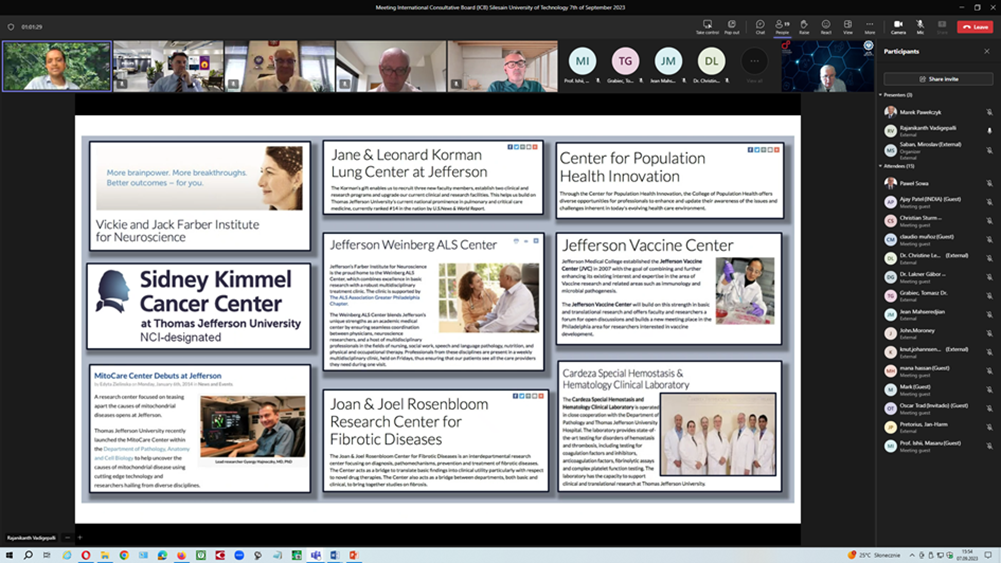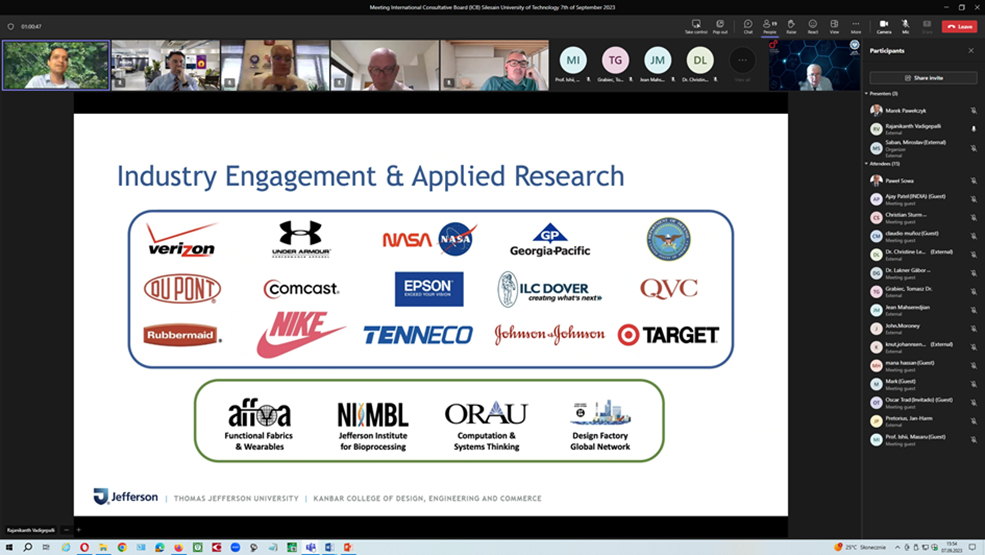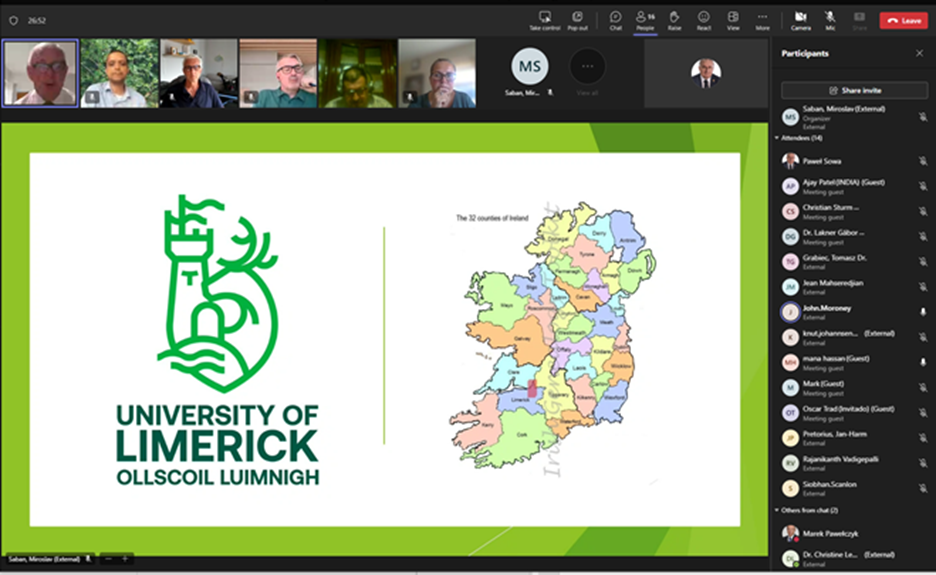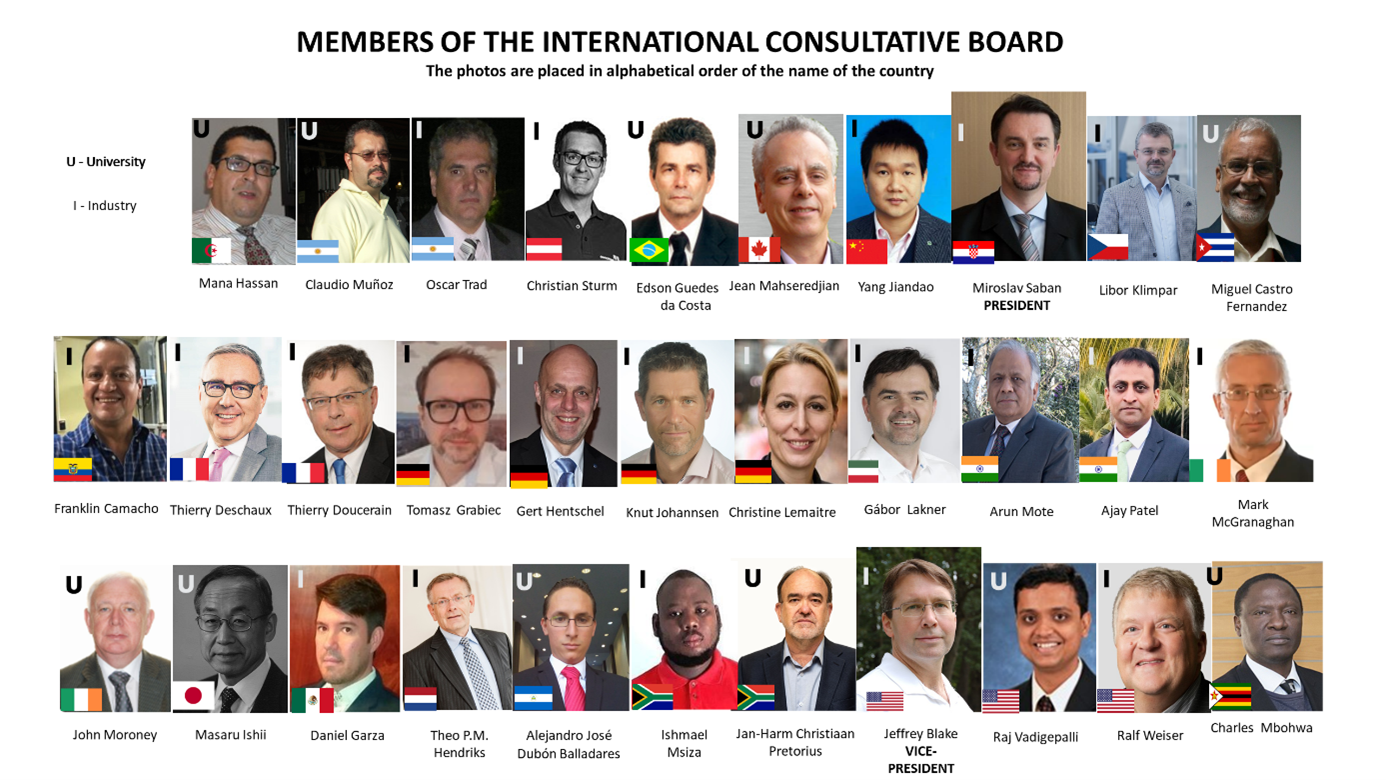Start - Trzecie posiedzenie Międzynarodowego Zespołu Konsultacyjnego na Politechnice Śląskiej
Trzecie posiedzenie Międzynarodowego Zespołu Konsultacyjnego Politechniki Śląskiej

Meeting was opened by Prof. Paweł Sowa, PhD, DSc, the Rector’s Plenipotentiary for the International Consultative Board. He welcomed the Vice Rector for Science and Development Professor Marek Pawełczyk, PhD, DSc, present at the meeting and then he invited the new members of the board to present information on themselves and others to provide their comments on the topic and information on their experience with the cases of this type of cooperation.
- Professor Marek Pawełczyk has been introducing new academic year to the participants of the meeting and shared some of the latest University updates . He shared great news related to extraordinary event in the history of University - awarding the title of Doctor Honoris Causa of the Silesian University of Technology to a Nobel Prize winner, prof. Brian Kobilka for Stanford University.
- ICB President Miroslav Saban stated that partnerships in the technology and research and development sectors are essential. Technology gets more complex every day, and it becomes impossible for academic institute of a single company to keep up with all these developments. It is therefore essential for companies to come together to reach further and form different format of partnerships. We are very pleased to witness how Silesian University of Technology has been forming platform for partnership amongst a number of renown world academic and technology centers in a very efficient format. We are also pleased to acknowledge that members of ICB of Silesian University of Technology do contribute in disseminating of ideas of partnering among other international organization and connecting it across geographies. In that positive light we have been starting our ICB Team meeting on 8th of September 2023.

- Meeting was continuing with introduction of the new members of the board : Mr John Moroney, Professor Masharu Isii and Professor Raj Vadigepalli.
- Prof. John Moroney, is new member of the board, and is representing University of Limerick and Claire County. Prof. Moroney presented University of Limerick as well indicated its 50th birthday. University of Limerick status as per 2023. Number of students in current academic year is 18200. Size of the plot of the campus is 316 acres. University has 255 programs. Most significant initiative in Irish higher education since 1966. University of Limerick response to key international industry requirements: Academy Model, Industry Lead, efforts towards Talent acquisition and retention. Strong base in UL for Innovation and Research. Significant efforts invested towards Connectivity among student community and externally towards other universities. Project represents Europe's new University town. There will be special effort/focus towards Aviation and Life Sciences. Project to be designated by Government of Ireland as a Strategic Development Zone. Immediate Priorities of University is establishment of Coalition of University Partners.
- Professor Masaru Ishii has acting as Professor Emeritus, The University of Tokyo, Tokyo, Japan. Professor Ishii has been elected into the academic role in 2013 as Professor, Institute of Industrial Science, UT. From 2007-2008 he was acting as Vice President, IEE of Japan. Professor Ishii was acting in role of President, Institute of Electrical Installation Engineers of Japan in period from 2015-2019. At present he is Visiting Professor, Chubu University, Aichi, Japan. Professor Ishii specialty is High Voltage Engineering. His special field of interest and Research: Lightning, Lightning Protection, High Voltage Measurement. The University of Tokyo was established in 1877 as the first national university in Japan. As a leading research university, UTokyo offers courses in essentially all academic disciplines at both undergraduate and graduate levels and conducts research across the full spectrum of academic activity. The University aims to provide its students with a rich and varied academic environment that ensures opportunities for both intellectual development and the acquisition of professional knowledge and skills. To learn more about the University of Tokyo, please visit the pages below.

- Professor Raj Vadigepalli Professor and Vice Chair of Research at Thomas Jefferson University. Over 20 years of experience in Systems Biology, Network Modeling, and Bioinformatics. Professor Vadigepally developed novel bioinformatics software, pattern analysis algorithms and visualization tools. He also built and led a multi-functional team with skills in engineering, computer science, and biology. His efforts are done towards leading cross-disciplinary collaborations with research groups across five countries. Professor Vadigepally has two decades of experience in educational outreach and talent development in bioinformatics. He has strong community engagement through organization of symposia at international meetings. Raj has been working at Thomas Jefferson University currently as Co-Director, Cell Biology and Regenerative Medicine PhD Program, as well as taking the role of Co-Director, Scholarly Inquiry in Digital Health Co-Director, Scholarly Inquiry in Digital Health. Raj is also holding functions of Vice Chair of Research as well as Professor
- Miroslav Saban, President of International Consultative Board was sharing his experience with topics related to Artificial Intelligence in Medicine. At Philips, we believe the value of AI is only as strong as the human experience it supports. That’s why we combine the power of AI with deep clinical knowledge to create solutions that integrate into the workflows of healthcare providers and people’s daily health routines – supporting them at every stage of the health continuum. From diagnostics to acute patient monitoring and self-management of chronic disease, AI has shown strong potential to support healthcare providers and patients at every stage of the care continuum. But for AI-enabled solutions to take hold, they need to integrate into the workflows of healthcare professionals and people’s daily health routines. And only by combining AI with deep clinical knowledge can we glean the most relevant insights from data that truly make a difference at the point of care. That’s why healthcare professionals and patients need to be at the heart of AI innovation in healthcare. Philips envision three ways in which AI can enhance the human experience in healthcare:

- AI can augment the expertise of healthcare providers and support their decision-making, allowing them to do what they do best: detect, diagnose, treat, and monitor disease. For example, AI can aid radiologists, cardiologists and other specialists with the segmentation and quantification of medical images, for enhanced diagnostic confidence and consistency. AI can also enable acute care teams to keep a caring eye on patients and spot early signs of health deterioration, based on an analysis of multiple vital signs, for timely intervention and reduced risk of readmission.
- AI can improve operational efficiency to help healthcare providers focus on patient care. For example, workflow automation in radiology can alleviate the burden on time-pressured imaging technologists, allowing them to focus on obtaining optimal image quality. AI can also enable predictive maintenance of medical equipment to prevent avoidable and costly disruptions that frustrate staff and patients alike. And on an enterprise level, AI can help forecast and manage patient flow from admission to discharge, ensuring the right care gets delivered in the right place at the right time.
- AI can empower people to take better care of their health and well-being by offering personalized and actionable insights that help them develop and maintain healthy habits. For example, in oral healthcare, AI can analyze an individual’s brushing behavior through sensors embedded into a smart toothbrush, and – through a mobile app – offer personalized recommendations for improving one’s oral hygiene. Similarly, AI can motivate people with chronic disease to take an active role in their therapy, promoting a shift from reactive to preventative care

As special topic of interest was related to following question: need to understand how the Universities approach the industry (and vice versa) in regard to the common cooperation and innovation development and what are usually the sources of project funding? (Tomasz Grabiec). Topic was elaborated well by professor Raj Vadigepalli.
The meeting ended with closing remarks made by the Vice Rector Prof. Marek Pawełczyk on further cooperation. Prof. Paweł Sowa also mentioned that the topic of the next meeting will be determined through a consultation between the president and all members of ICB.








